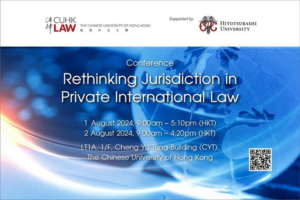Conference on Rethinking Jurisdiction in Private International Law (1 & 2 August 2024 @ CUHK)
This information is kindly provided by Dr. King Fung (Dicky) Tsang, Associate Professor, the Chinese University of Hong Kong.

CUHK LAW will host an international conference on private international law from August 1, 2024, to August 2, 2024.
Theme
The theme of the conference is “Rethinking Jurisdiction in Private International Law.” Jurisdiction is a broad concept in private international law that includes legislative, judicial, and enforcement aspects. Over the past few years, there have been significant developments in the area of jurisdiction across various countries. These developments, while rooted in national law, have extensive cross-border impacts. Additionally, the HCCH Jurisdiction Project has engaged many countries in focusing on jurisdictional issues and seeking to harmonize jurisdictional conflicts. This conference offers a forum for academics and practitioners to rethink and exchange ideas on the evolving new features of “jurisdiction” in the context of private international law.
This conference is supported by Hitotsubashi University.
Speakers, Abstracts and Programme:
The lists of the speakers, abstracts and the programme can be found respectively here, here and here
Venue:
The Conference will be held at the Cheng Yu Tung Building (CYT) which is located in Sha Tin, Hong Kong.
Address:
LT1A, 1/F, Cheng Yu Tung Building (CYT), The Chinese University of Hong Kong (Map)
Transportation:
MTR: Get off at the University Station. CYT Building is just 1-minute walk away from Exit B.
Languages:
The first day will be conducted in English, while the second day will mainly be in Mandarin Chinese. Attendees are welcome to participate in sessions on both days.
Details and registration
Please visit the conference website for more details. If you would like to attend, kindly register here by 31 July 2024, 3:00 pm.
For enquiries, please contact CUHK LAW at law@cuhk.edu.hk.
FACULTY OF LAW
The Chinese University of Hong Kong | Shatin, NT, Hong Kong SAR, China
T: +852 3943 4399 | E: law@cuhk.edu.hk | W: https://www.law.cuhk.edu.hk


